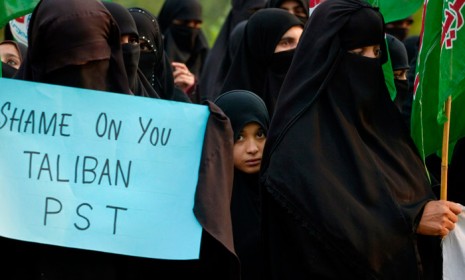Malala Yousafzai: Will her shooting end Islamic extremism in Pakistan?
Pakistanis are united in condemning a brazen attack on a 14-year-old girl, but it's an open question whether this anger will translate into real change


A free daily email with the biggest news stories of the day – and the best features from TheWeek.com
You are now subscribed
Your newsletter sign-up was successful
On Monday, Malala Yousafzai, the Pakistani schoolgirl shot and severely wounded by Taliban gunmen, arrived in England for medical treatment. Malala, only 14 years old, had been targeted for demanding equal education opportunities for girls, which the Taliban claimed was a violation of Islamic law. Malala's shooting has sparked near-universal outrage in Pakistan, and even politicians, most of whom are afraid to cross Pakistan's powerful extremist groups, have openly condemned the Taliban. The Pakistani state, whose most powerful organ is the army, has long quietly tolerated extremist groups, many of which are used as military proxies in India and Afghanistan. But popular resentment against the Taliban is at an all-time high, putting pressure on the army to finally crack down on Islamic extremism. Does Malala's shooting mark a turning point?
Pakistan must seize the moment: Malala's "story now has the potential, if fully utilized, to bring about a serious geopolitical change in the region that could actually help stabilize both Pakistan and Afghanistan," says Ahmed Rashid at The New Yorker. Pakistanis have made it "clear that they, the majority, do not support this brand of Islamic fundamentalism," and are "calling on the army to carry out its much delayed offensive" against "ever-growing networks of extremists." If the army demurs, "it may find itself ostracized by the very public whose support it seeks." Pakistan must stamp out extremism if it wants "to develop as a modern state" — "now could be that moment," but "it won't last forever."
"Can Malala bring peace to Pakistan and Afghanistan?"
The Week
Escape your echo chamber. Get the facts behind the news, plus analysis from multiple perspectives.

Sign up for The Week's Free Newsletters
From our morning news briefing to a weekly Good News Newsletter, get the best of The Week delivered directly to your inbox.
From our morning news briefing to a weekly Good News Newsletter, get the best of The Week delivered directly to your inbox.
But the Taliban's influence is strong: Malala's shooting "should be a catalytic event, uniting the nation against the insanity of the Taliban worldview," says Ghazi Salahuddin at Pakistan's The News. But while there is a "fresh resolve to combat terrorism," extremist groups in Pakistan "have repeatedly demonstrated their ideological and political clout." In that respect, "Malala and the Taliban symbolize the opposing sides in a conflict that has been raging in this country for quite some time," and "ultimately, like all wars, it has to be fought in the minds of the people."
And Pakistan lacks leaders who will take a stand: Pakistan's tolerance of extremist groups is "shortsighted, even suicidal," says Trudy Rubin at The Philadelphia Inquirer. But it remains unclear "whether Malala's sacrifice is enough to wake the country to the threat it faces." Islamist groups have not condemned the Taliban by name, while a leading opposition figure, Imran Khan, continues to support negotiations with the militants. Pakistan's generals expressed their support for Malala, but continue to harbor "terrorist groups that murder Pakistani Shiites, Ahmadis, and Christians." No change can "happen unless Pakistani generals and politicians display the same courage as this young girl."
"Will attack on a child at last prod Pakistan?"
A free daily email with the biggest news stories of the day – and the best features from TheWeek.com
Ryu Spaeth is deputy editor at TheWeek.com. Follow him on Twitter.